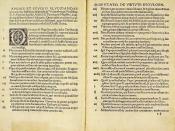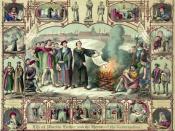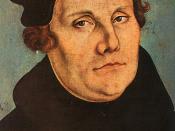In the early sixth century in Rome there was the practice of keeping a record of the lives of popes in what was known as Liber Pontificalis. "The orthodox collection of these lives was continued well into the Middle Ages and is a standard historical source, whose value for popes, from the late fifth century onwards particularly is well known" (O'Donnell 38). But these writings in Latin Christianity were confined to a well-educated, powerful minority (papacy/clergy) who used "the written word with sophistication to organize and control their world" (O'Donnell 38). They used these (often forged) texts as authoritative proof to run the public and spiritual life to their advantage. But the validity and relevance of these texts was often highly questioned and threatened.
Religious changes usually occur in response to changes in society. Technological progress - "The development of the printing press was a quantum leap in the speed of communication...(and)
an important step toward the evolution of true mass media" (Jowett 45). It was Johannes Gutenberg's invention that opened the floodgates of communication and increased the power and control of the message. It both empowered the masses as well as increased power and control over them. The Gutenberg Bible was the first printed Bible and the first large book to be printed from moveable metal type. It was printed in Mainz, Germany, around 1534. It is also known as the 42 Line Bible, having 42 lines to the page. "And printing was the fulcrum of the Reformation, enabling religious dissent to inspire a mass movement" (http://www.picturesandstories.org/gutenberggalaxy.html).
The most important break with archaism and the power of the Catholic Church lay in Martin Luther's hands - in his decision to translate the Bible from Latin into German. Martin Luther (1483-1546), the great German religious reformer, a professor in...


